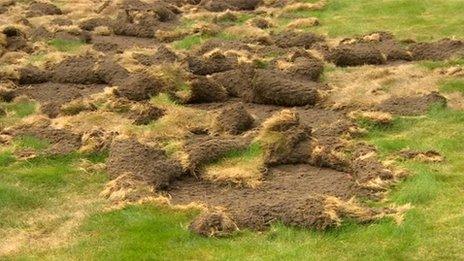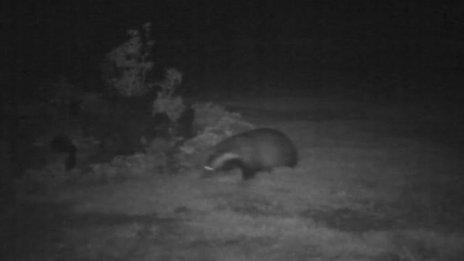Are urban badgers a problem or a boon to city life?
- Published
- comments

The badgers have found larvae and insects underneath the turf
So, badgers have invaded a garden in a Birmingham suburb and done a fair bit of damage to what should be a nice piece of lawn.
Owner Peter Wall got in touch with BBC Midlands Today, and he is certainly unhappy.
Although he does not wish any harm on the animals, he just wants them to leave his lawn alone.
So, are "urban badgers" becoming more of a problem overall - and if there are badgers living in our towns and cities, are they actually a different sort of animal when compared to their country counterparts?
Different beast
There is not as much data about urban badgers as you might expect, but fortunately one researcher looking into this very area has recently moved to Warwickshire.
Ben Devine now works at the Warwickshire Wildlife Trust but, he has only recently finished an extensive study of urban badgers in Sheffield and the implications for expanding urban badger populations all over the UK.

Peter Wall says he and his wife were 'absolutely devastated' by what has happened to their lawn
First of all, it does appear that the urban badger is a different beast to those found in the countryside.
According to Ben's research and that of others: "Urban badgers differ in their behaviour and ecology to rural populations in terms of diet, population dynamics, social organisation and ranging/dispersal behaviour".
It is likely that diet might be a problem here.
Urban badgers are actually bigger than their rural cousins because so many people put out food for them.
If someone on Peter Wall's street is feeding the badgers, that will also encourage them to look for other food sources nearby - in this case, the badgers have found the larvae and insects under the turf.
Of course, not all neighbours see badgers as a problem, so convincing badger-lovers to stop feeding them could be difficult.
Numbers increasing
Generally, badger numbers in urban areas seem to be increasing.

BBC Midlands Today filmed the badgers at night
The animals are highly protected so you need a licence if you are going to interfere in anyway with a sett.
From monitoring these applications, Ben says that since 1992 there has been a steady increase in the frequency of license applications to deal with "problem setts" in urban areas.
He says that this naturally suggests that more badgers are living in urban areas.
That is bad news for lawn-lovers and it seems it is easier to persuade country badgers to move on than the more wily urban badger, says Ben.
"According to the Defra licensing database, the success rate for urban main sett closures is lower than for comparable rural operations," he says.
So, that just leaves the interesting question of how we are going to manage living closer than ever to our largest, carnivorous mammal?